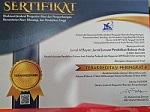Epistemology of Arabic Language Learning Technology Development
Abstract
Keywords
Full Text:
PDFReferences
A. Dzo’ul Milal, ‘The Curricular and Extra Curricular System of TEFL: A Case Study at Pondok Modern Gontor Indonesia’, Indonesian Journal of English Teaching, 1.2, (2013): 15.
Abdul ‘Aziz Ibrahim, Al-‘Ushaili, Asâsiyat Ta’Lîm Al-Lughah Al-‘Arabiyah Li an-Nâthiqîn Bi Lughât Ukhra, Riyadh: Jami’ah al-Imam Muhammad bin Su’ud al-Islamiyah, 1423 H.
Abdul Muntaqim, ‘‘The Use of Information Technology-Based Arabic Learning Media in the Arabic Language Center (PKPBA)’, Universitas Islam Negeri Maulana Malik Ibrahim Malang’, Tarling, 3.1 (2020): 41-58.
Abdul Wahab, Muhbib, ‘Standarisasi Kurikulum Pendidikan Bahasa Arab Di Perguruan Tinggi Keagamaan Islam Negeri’, Arabiyat : Jurnal Pendidikan Bahasa Arab Dan Kebahasaaraban, 33.1 (2016): 34-35.
Abdurrahman Faridi, ‘‘Inovasi Pembelajaran Bahasa Inggris Berbasis ICT Dalam Rangka Meningkatkan Mutu Pendidikan’, Jurnal Lembaran Ilmu Kependidikan, 38.1, (2009): 34.
Adtma A. Hasan., ‘“Model Pembelajaran CTL Berbasis IT Untuk Menguasai Mufrodat Bahasa Arab”’, Al-Lisan, 5.2, (2019): 135.
Ahmad Nurcholis, Budi Harianto, Ely Nur Khanifah, Syaikhu Ihsan, ‘“Pengembangan Kurikulum Bahasa Arab Berbasis Karakter Di MIN 1 Tulungagung”,’ Arabiyatuna, 3.2 (2019): 283-298.
Ahmad Nurcholis, Syaikhu Ihsan Hidayatullah, Muhamad Asngad Rudisunhaji, ‘Karakteristik Dan Fungsi Qira’Ah Dalam Era Literasi Digital’, El-Tsaqafah, 18.2, (2019): 131-146.
B. A. Knight, S. Galletly, J. Morris, & P. Gargett, ‘“Reading Instruction Strategies to Reduce Cognitive Load”,’ Practical Literacy: The Early and Primary Years, 23.2, (2018): 65-86.
B. A. Knight & S. Galletly, ‘‘Effective Literacy Instruction for All Students: A Time for Change,’ International Journal of Innovation, Creativity and Change, 3.1, (2107): 65-86.
Bruce Allen Knight and Susan A. Galletly, ‘Bridging the Gap Between Reading Theory and Innovating Teacher Practice’, International Journal of Innovation, Creativity, 13.8, (2020): 11.
C. M. Connor & F. J. Morrison, ‘“Individualizing Student Instruction in Reading: Implications for Policy and Practice”,’ Policy Insights from the Behavioral and Brain Sciences, 3.1, (2016): 54-61.
Dina Indriana, ‘“Evaluasi Pembelajaran Dan Penelitian Autentik Dalam Pembelajaran Bahasa Arab”,’ Al-Ittijah, 10.2, (2018): 46-51.
Donny Handriawan, ‘“Mempertegas Kembali Arah Pembelajaran Bahasa Arab”’, Al-Mahara, 1.1, (2015): 55.
E. L. Criswell, ‘The Design of Computer Based Instruction’, New York: Macmillan Publishing Company, 1998.
Eka Utari Handayani, ‘‘Desain Pengembangan Kurikulum Bahasa Arab Dengan Mengggunakan Media Video’, Pendekatan Teknologi Digital’, Taqdir, 4.2, (2019): 30.
Hanani, Nurul, ‘Prospek Pendidikan Bahasa Arab Di Indonesia Pada Era Perkembangan Zaman’, Didaktika Religia, 4.2, (2016): 27.
Huberman, Matthew B. Miles dan A. Michael, Analisis Data Kualitatif, Buku Sumber Tentang Metode-Metode Baru, Jakarta: UI-Press, 2014.
Iswanto, Rahmat, ‘Pembelajaran Bahasa Arab Dengan Pemanfaatan Teknologi’, Arabiyatuna : Jurnal Bahasa Arab, 1.2 (2017): 143.
K. Glasswell, P. Singh & S. McNaughton, ‘“Partners in Design: Co-Inquiry for Quality Teaching in Disadvantaged Schools”, Australian’, Journal of Language & Literacy, 39.1, (2016): 20-29.
K. Joyce and N., ‘Cartwight, “Bridging the Gap between Research and Practice: Predicting What Will Work Locally”’, American Educational Research Journal, 57.3, (2020): 1045-1082.
Made, Wena, ‘Strategi Pembelajaran Inovatif Kontemporer: Suatu Tinjauan Konseptual Operasional’, Jakarta: PT. Bumi Aksara, 2009.
Manuel, Jacqueline, and Don Carter, ‘Current and Historical Perspectives on Australian Teenagers’ Reading Practices and Preferences’, Australian Journal of Language and Literacy, 38.2, (2015): 115-128.
Maysa’ Abu Syanab, ‘‘Tiknulujia Ta’Allum AlLughah Al-“Arabiyah”,’ Journal Al-Adab Wa AlTarbiyah, 2.32, (2007): 66.
Mohammad Ahsanuddin, ‘“Pemanfaatan Internet Dalam Pembelajaran Bahasa Arab”’, Al-Arabi, 3.1, (2005): 1-13.
Moleong, Lexy J.,”Metodologi Penelitian Kualitatif Edisi Revisi”. Bandung : Remaja Rosdakarya, 2019.
Muhammedi, ‘Perubahan Kurikulum Di Indonesia : Studi Kritis Tentang Upaya Menemukan Kurikulum Pendidikan Islam Yang Ideal’, Raudhah, 4.1, (2016): 61.
Muhzin Nawawi, ‘Pengembangan Kurikulum Pendidikan Bahasa Arab (Kajian Epistemologis)’, An-Nabighoh, 19.1 (2017): 90-91.
Najah, Zughrofiyatun, and Azzah Saniyyah Maulana, ‘Mahârah Al-Kitâbah Learning Through Mind Mapping Strategies’, Jurnal Al-Bayan: Jurnal Jurusan Pendidikan Bahasa Arab, 11.2, (2019): 340-355.
Noor, Fatwiah, ‘Kurikulum Pembelajaran Bahasa Arab Di Perguruan Tinggi’, Arabiyatuna : Jurnal Bahasa Arab, 2.1, (2018): 19.
P. Hubbard, "Learner Training for Effective Use of CALL". State College PA: Center for Advance’, 2006.
Rahmap, ‘“Neologisasi Dalam Bahasa Arab”’, Alfazuna, 1.1 (2016): 51-53.
Rais Abdullah, ‘“Teaching Media in the Teaching of Arabic Language to Non-Native Arabic Speakers”’, Dinamika Ilmu, 16.1, (2016): 93-106.
Richard E. Clark, ‘“Reconsidering Research on Learning from Media”,’ Journal JSTOR, 53.4, (1983): 445-459.
Rifqi Aulia Rahman and Indah Kumalasari, ‘“Rekonstruksi Epistemologis Pendidikan Bahasa Arab Di Era Disruptif”,’ Armala, 1.1, (2020): 24-40.
Risna Rianti, ‘“Students” Perception toward Social Media Assisted Language Learning (SMALL) for Arabic Learning,’ Izdihar. 2.2, (2019): 101-114.
Ritonga, Mahyudin, Alwis Nazir, and Sri Wahyuni, ‘Pembelajaran Bahasa Arab Berbasis Teknologi Informasi Dan Komunikasi Di Kota Padang’, Arabiyat : Jurnal Pendidikan Bahasa Arab Dan Kebahasaaraban, 3.1 (2016): 1-12.
S. M. Anwaruddin, ‘“Teachers” Engagement with Educational Research: Toward a Conceptual Framework for Locally-Based Interpretive’, Interpretive Communities’, Education Policy Analysis Archives, 23.40, (2015): 1-25.
Soekarba, Siti Rohmah, ‘Buku Al-Arabiyyatu Bayna Yadaik (Analisis Pengajaran Bahasa Arab Dalam Perspektif Lintas Budaya)’, IJAS: Indonesian Journal of Arabic Studies, 1.2, (2019): 64.
Syafe’i, Imam, ‘Model Kurikulum Pesantren Salafiyah Dalam Perspektif Multikultural’, Al-Tadzkiyyah: Jurnal Pendidikan Islam, 8.2, (2017): 128.
Ubaid Ridlo, ‘“Bahasa Arab Dalam Pusaran Arus Globalisasi: Antara Pesimisme Dan Optimisme”’, Ihyaul Arabiyah, 1.2, (2015): 222-224.
Umi Machmudah, Ahmad Nurcholis, Yusuf Hanafi, Moh. Khasairi, ‘’”Epitome” Solution to Nahw Instruction: Strategies toward “I’rab Reading” Abilities for Students’,’ International Journal of Innovation, Creativity, and Change, 13.8, (2020): 832-849.
Wahab, Muhbib Abdul, ‘Peran Bahasa Arab Dalam Pengembangan Ilmu Dan Peradaban Islam’, ARABIYAT: Jurnal Pendidikan Bahasa Arab Dan Kebahasaaraban, vol.no, (2014): 3.
Wibowo, Fatih Rizqi, ‘Problematika Pembelajaran Bahasa Arab Kurikulum 2013’, Al Mahāra: Jurnal Pendidikan Bahasa Arab, 2.1, (2016): 63-64
Yusring Sanusi Baso, Program Multimedia Bahasa Arab, Padang: Prosiding PINBA IMLA, 2013.
DOI: http://dx.doi.org/10.24042/albayan.v13i1.7090
Refbacks
- There are currently no refbacks.
Copyright (c) 2021 Jurnal Al Bayan: Jurnal Jurusan Pendidikan Bahasa Arab
License URL: https://creativecommons.org/licenses/by-sa/4.0
Editorial Office:
Jurnal Al Bayan: Jurnal Jurusan Pendidikan Bahasa Arab, Arabic Education Study Program, Faculty of Education and Teachers Training, Unversitas Islam Negeri Raden Intan Lampung
Jl. Endro Suratmin 1 Sukarame, Bandar Lampung 35131-Indonesia
e-mail: jurnalalbayan@radenintan.ac.id
http://ejournal.radenintan.ac.id/index.php/albayan/index
Jurnal Al Bayan: Jurnal Jurusan Pendidikan Bahasa Arab is licensed under a Creative Commons Attribution-ShareAlike 4.0 International License. p-ISSN 2086-9282 | e-ISSN 2549-1229









